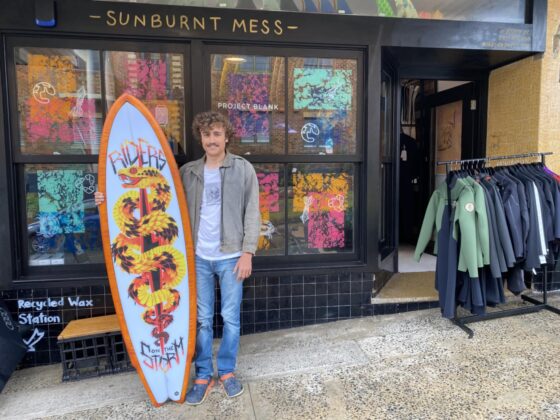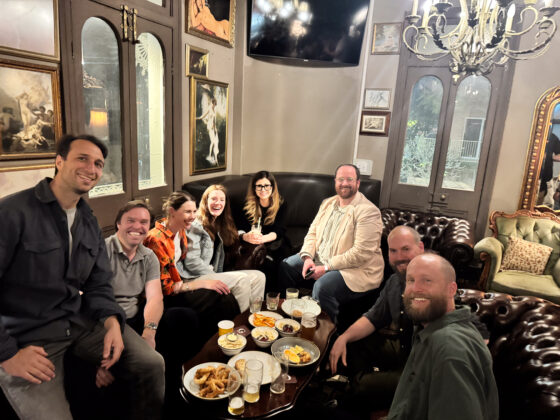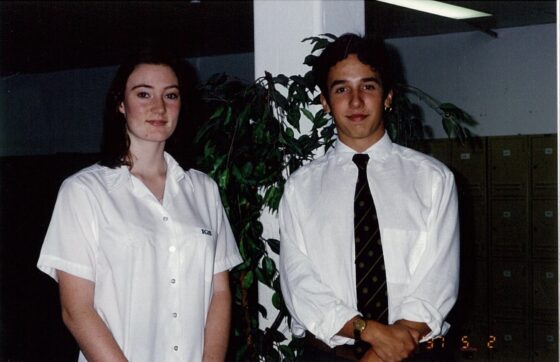Paul Galea:
Hello Dan. You’re living in Montreal in Canada, in the province of Quebec. When did you leave IGS and just give us a bit of a rundown on how you ended up in Montreal and what you’re doing in Montreal?
Dan:
Okay, so it was 2009. So that’s fifteen years ago now since I left. I chose to do two degrees. I did an Arts and a Science degree and then after that, I did a Theatre degree, which was very interesting. I did a kind of travelling show that went to elementary schools and high schools in Australia. As a result of doing the show I got really interested in children’s theatre and also I moved out of Sydney in that moment and I was really in love with the idea of travelling around. In my university time, I had done an exchange semester in Montreal. So I had visited Montreal previously and all of this kind of came together, along with a kind of long, burning romantic relationship, with me finally deciding to move to Montreal. So that’s basically how I got here. Yeah, almost seven years ago, now. I think it really seems like a new home; a whole second home for me.

Paul Galea:
Good. Now, I’m going to disclose that I’ve known your family for a long time and you’ve had brothers and sisters go through with you or after you at IGS and I’d name your dad* as a very, very significant figure in the school in that he’s had a lot to do with talking about youth mental health. And that’s been a big part of what’s been going on not only in my life, but in the life of the school. So one of the things I do know is that you come from basically a family of medical people or people interested in medical sciences and things like that. And I’ve just been interested in that you said you did a science degree first and then you went into the theatre and that sort of drama side of things. I’m really interested to see how that sort of took place because they’re fairly far apart. I think your first degree was something to do with medicine or something along those lines. And then next second, you’re in theatre, a performer and producer and a creative. Give us a bit of a rundown on that process.
Dan:
That’s a really good question. And it’s a fun one for me to answer. So yeah, you’re absolutely right. I’ve kind of got three parents, who have been active in my whole life and all three of them work in mental health. And my grandparents worked in health in general, as well. So that’s a big kind of science and health stream running through my direct family. I think first of all, I’ll say that, yes, I did try science. My first degree was in arts and science and I was interested in science and healthcare. The attraction I have to theatre, I think, comes from my family too. My interest now in theatre, it’s really about the culture of my family. Both my parents had lots of siblings; groups of five and seven, respectively. All of those people would gather in Sydney often during my childhood, which meant that we had kind of big gatherings of the community around us. Lots of fun with joyful, playful singing, performative concerts together in the holidays, but also just like every weekend, and I think that part of my family, that kind of big community, celebrating together, storytelling together, being together is what I feel like really comes out now in my theatre life. I really kind of draw a line from my family through my theatre life. Yes, my parents have an intellectual interest in health and mental health. And I can see why it’s a really interesting domain of knowledge to go searching within but I also think of them as really social people; people that are really interested in community, people really interested in not just helping people up and over the problems that they had, but celebrating with people as well. And seeking out joy with other people. And yeah, I think growing up in that environment is really cool.

Paul Galea:
Look, I’m just going to jump in here because I’m actually interested in that because I’ve also got a wife who’s in theatre, and I’ve had children involved in drama but I actually think in some strange way working in community and working with theatre and working with young people acting is sort of, in some ways, helping with mental health as well. And I think maybe, you know, in some weird way, you sort of ended back to where your family has got a strong leaning but you’ve just gone a slightly different path to that.
Dan:
Yeah, I think that’s insightful and absolutely true. They are kind of dealing with the same thing, which is, you know, on a day to day basis, what it’s like to spend time with other people and sometimes there are downs, and the downs might look like mental healthcare and the upside looks like theatre and vice versa. I think you’re absolutely right. They are connected.

Paul Galea:
Obviously, you’ve been doing it a while now, and obviously you’re very much at home in Montreal, and you’re getting plenty of positive feedback in terms of positive feelings in terms of doing it. So I’m just wondering, do you think that theatre and that sort of stuff has got a bit bigger role to play in helping youth mental health because, you know, it’s massive, particularly after COVID. I’d be interested in your thoughts on that.
Dan:
Oh, it’s a great question. I do think it has a big role to play. So, in the work that I do, I would say I deal with, or I interact with young people from age five. So right at the beginning of primary school, right up to seventeen, at the end of high school, that kind of changes what I do. What I noticed is that for primary school kids, there’s a really natural way in which they are already playing with each other. They’re already doing storytelling, they’re already having positive interactions with each other. And you can see that in the theatre class, even though it’s kind of organised around theatre, it’s a really positive experience. And it’s all about this group having fun. Then when we come into high school, and the experiences I’ve had with high school, I can see that that desire is still there for students to connect with their friends in a personal and a face to face, playful way and sometimes it’s a bit harder because of being a teenager and a young adult. There are changes going on and there are barriers to navigate but I can see that that desire is still there. So when I see high school kids in other contexts, building plays together or doing an improv together, or writing plays together-any of this stuff that is in the theatre world, it always seems to me like they are connecting more than they will do usually. They look to me like they’re maybe less stressed in this space than they might be otherwise. The kind of bonds that they’re building, thinking deeper. I just think this tool of theatre, even though maybe later on adults’ storytelling might have a bit of more seriousness around it, for young adults, it’s a really positive tool for building connections. I think it’s one of the things that everybody should try. I can also see that same kind of positive outcome happening for young people and their mental health in other activities. It doesn’t have to be theatre. That’s something where I see it working but it could be, you know, musical ensembles. It could be for sports. It could be religious groups, it could be baking groups. It could be you know, whatever! I just know from my experiences in those spaces where people come together in groups, they’re working on a shared project or building a shed. It seems to me like it’s really positive for mental health in general.

Paul Galea:
As you probably know, one of the things that was a hallmark of my time at IGS was the whole clubs and co-curricular program thing. And one of the things that we found was that just that connection between the younger people or the teenagers in terms of meeting people who had similar interests had massively positive effects on them and, then you’re just throwing them into a community, even a small community of say D and D players, that gives people a home and something which gives them security and reduces anxiety. So, I think, theatre is one of them, and a different one, but anything where we can promote community and connectedness is going to be pretty good.
So Montreal, mate? I spent some time living and working in Montreal when I was younger and it’s a fascinating place. One of the most fascinating things, I think, is that it is a truly bilingual city and I’m just wondering how you find that having come from IGS, where we’re a language school. I’m just wondering how you found Montreal and its bilingual atmosphere.
Dan:
Yeah, Montreal is a really interesting place. I lived in Sydney, where there’s many, many languages but in Montreal, it’s the case that both English and French are equally common languages. Most people can speak confidently in both of those languages, and it’s really interesting. I think there are positives and big challenges as well. You know, positively speaking for me as an Anglophone, someone who grew up speaking English, I get some kind of whole new Francophone world. Folks who speak French have different histories, are obviously using different words, they bring different stories and different cultures and they think about political questions differently, and they have different conversations that those who haven’t been in their world are having. We’re not having them in the Anglophone world, and the opposite is true as well. I think that’s really interesting. I love the challenges of learning a new language. I feel pretty, kind of competent at this point. I spend, probably, 20 to 30% of my week speaking in French at work and in social situations. And I feel confident but that is so far away from being fluent. There’s just so much to learn and come across and I find it really fun and interesting. Then there are challenges as well. And there’s a kind of four or five hundred year history here of conflict-both, actual conflict and political conflicts between Anglophone and Francophone communities for who has got more power and who has got more place in this space and how many of one group exists versus the other group and, that plays out today, in which, being an Anglophone in Quebec is kind of a bit more of a struggle. There are less and less opportunities for Anglophones in Quebec, so there are challenges as well. I mentioned both of those because they kind of create this atmosphere that’s really interesting and really fun to be a part of. Lots of challenges to deal with, too.

Paul Galea:
I know that when I was there, which was in 1988, there was a fairly strong movement for Quebec to secede from the rest of Canada. And in fact, my Quebecois girlfriend had two brothers who were extremely militant about Quebec and advocated quite violent actions. They could not speak a word of English and they had no intention of speaking English! They were French speakers! So I could only really communicate through their sister, but also through my schoolboy French but they were super passionate about it. I’m sure that in some quarters, that’s still the same.
Dan:
Absolutely. It’s a little bit less violent times now, I think, than in the 60s, 70s and 80s. It’s definitely less violent; there’s much less physical threat but political militancy continues.
Paul Galea:
Alright, good. So let’s go back in the time machine to IGS. Have you got some good memories of IGS, things that stand out for you, that you remember?
Dan:
Yeah, I have got so many good memories of IGS. So I feel really lucky to have gone there because when I think about it, positive things jump back in. I think honestly, when I remember, the first thing that pops into my mind and it is just something that I still talk about it to people now because I’ve since found out it’s pretty rare. We spent so much time with people from other years in Tutor Group. Maybe it’s changed, but when I was at school, we had to get up every morning for fifteen or twenty minutes with a cross section of people from different years and I can remember those people, especially when I was younger. People’s faces are stuck in my mind; people who were really open and generous to me. In another school environment, they probably would have had no idea who I was. So it stands out to me. Some of the events we had at school, again,were things that I never heard about happening elsewhere. We had International Day, where rooms became different country rooms and I remember that being all about food for me! Like how many different foods can I eat in a day? ArtsFest was a huge thing that I really loved. Is Mr. Dennehy still a teacher? At that point was Head of House and one year he wanted for our house performance to be a Haka so we worked on the Haka together and, again in retrospect, I just think that’s such a great opportunity to have a whole house group all get together. It’s really cool. I guess the final thing I’ll say, is in the day to day sense, I just kind of felt safe. I’m sure that is officially a kind of basic baseline for every school, but it was just true in my time and I just felt physically and emotionally safe, day after day with the culture that was going on there at that time.

Paul Galea:
Very good. If you think about it, that’s a big part of the whole vibe, the acceptance of diversity and people being allowed to be themselves. I also think what you’re saying about the vertical tutor groups is true. They are an integral part of what IGS is, the bigger kids looking after the little kids all the way through and the same kids you see every year. This is a hard question. Any advice for the young people out there about how to live their lives? Obviously no one’s going to hold you to any of this. Just general ideas about things that have worked for you or a path that worked for you?
Dan:
When I think about my transition from high school into adult life, my experience was very much that the things that I was interested in during high school changed when I arrived in university, the things that I was interested in at the university changed by the time I got to the end of university. Those things have changed again, and I’m not just talking about the small things I was doing yesterday, but I speak of a lot of trends and interest areas that I was interested in. That was really my experience. It took me years until my mid 20s to go, “Okay, you know, I have a real sense now of the things that I’m interested in and want to keep going with long term.” I would also share that just experience as many things as you can when you’re in high school. There’s so many things to be tried and I think openness to try lots of new things, and openness to the idea that what you will be doing can definitely shift many, many times. It’s a good way to go I think.
Paul Galea:
I think that’s pretty good advice. And we’ll leave it there. I’m assuming you come back to Sydney every now and if you come back to Sydney, I’d love to catch up and have a chat maybe over a coffee or a beer and see what we can come up with.
*Dan’s dad is Professor Ian Hickie from the Brain and Mind Centre, which has a long association with IGS.


